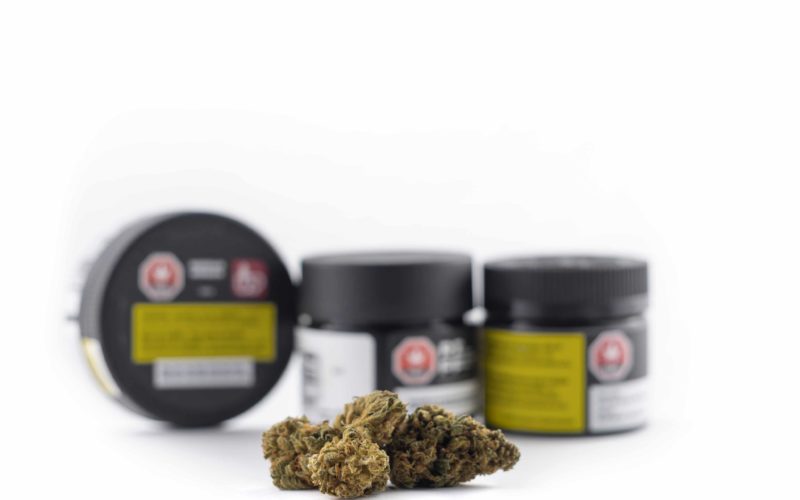Business
New Vermont Guidance Looks to Eliminate Plastic Waste From State’s Cannabis Industry

While witnessing the legal cannabis industry continually blossom over the years has been an exciting and invigorating experience for many, it’s also becoming increasingly challenging to ignore the amount of plastic waste involved. As states are required to enforce cannabis compliance, which generally means child-proof packaging for any products leaving the building, the result is often an abundance of single-use plastic that is more challenging to recycle than materials you might find at the grocery store.
Vermont’s Cannabis Control Board is looking to change that. In new “Guidance on Packaging,” released earlier this month, the board states that “packaging that is intended for consumer purchase at a retail location shall be reusable and shall not be plastic.” The guidance gives examples for acceptable reusable materials, including glass, tin, cardboard, and bamboo.
The packaging for cannabis must be child-deterrent and opaque. The guidance defines cannabis as all parts of the plant, including seeds; resin extracted from any part of the plant; and any compound, manufacture, salt, derivative or preparation of the plant, its seed or resin.
This is a new clarification, as “child-deterrent packaging” means tear-resistant packaging that can be sealed in a way that “would deter children under five years of age from easily accessing the content of the package within a reasonable time” while still being simple for adults to properly use and access.
Child-resistant packaging, on the other hand, includes packaging designed or constructed to be “significantly difficult for children under five years of age to open,” or to obtain a toxic or harmful amount of the substance in the container “within a reasonable amount of time,” also that adults can easily use.
It may seem like a small distinction, but child-deterrent packaging is generally a less burdensome requirement from a packaging standpoint, usually requiring less use of plastic or other hard materials.
The packaging for cannabis products, meaning concentrated cannabis and product that is “composed of cannabis and other ingredients,” intended for use and consumption, including edibles, ointments, tinctures and vaporizer cartridges with cannabis oil, must be child-resistant and opaque.
It’s a rational distinction to make, given that there are less risks of danger for a young child accessing cannabis flower than a cannabis edible. For example, a child would have to figure out some way to smoke the flower to experience its effects, whereas an edible or anything with activated THC would have a psychoactive effect upon consumption.
The new guidance also says that a licensee may seek a waiver to the prohibition on plastic consumer packaging if they can demonstrate a hardship in securing non-plastic packaging, including unavailability of non-plastic packaging; inability to achieve child-resistance; or the necessity to preserve shelf-life stability, prevent cannabis or cannabis product contamination or avoid exposure of cannabis/cannabis products toxic or harmful substances.
For those attempting to secure a waiver, a licensee must propose a packaging alternative that uses “de minimis plastic,” meaning only the amount of plastic “reasonably needed” to overcome the hardship identified in the waiver petition.
Vermont became the 11th state to regulate adult-use cannabis sales and the second state to do so legislatively, rather than through a voter initiative, nearly two years ago. Governor Phil Scott announced on October 7, 2020 that he would allow S. 54—the bill that would regulate and tax cannabis sales in the state—to become law without his signature.
“I know it is difficult to take on these complex issues remotely and during this unprecedented Pandemic,” Scott said in a statement at the time. “Again, I thank the legislators who worked to move toward me over the past two years on this issue. Nevertheless, the Legislature has much more work to do to ensure equity in this new policy and to prevent their work from becoming a public health problem for current and future generations. For these reasons, I am allowing this bill to become law without my signature.”
In 2021, the legislature moved forward to act on the promise of centering social equity, as the House and Senate passed S. 25, which looks to strengthen social equity provisions, requiring regulators to reduce or eliminate licensing fees for applicants who have been negatively impacted by federal enforcement of cannabis laws.
The new rules for plastic packaging will be in place when adult-use sales begin in Vermont, sometime later in 2022.
Business
New Mexico cannabis operator fined, loses license for alleged BioTrack fraud

New Mexico regulators fined a cannabis operator nearly $300,000 and revoked its license after the company allegedly created fake reports in the state’s traceability software.
The New Mexico Cannabis Control Division (CCD) accused marijuana manufacturer and retailer Golden Roots of 11 violations, according to Albuquerque Business First.
Golden Roots operates the The Cannabis Revolution Dispensary.
The majority of the violations are related to the Albuquerque company’s improper use of BioTrack, which has been New Mexico’s track-and-trace vendor since 2015.
The CCD alleges Golden Roots reported marijuana production only two months after it had received its vertically integrated license, according to Albuquerque Business First.
Because cannabis takes longer than two months to be cultivated, the CCD was suspicious of the report.
After inspecting the company’s premises, the CCD alleged Golden Roots reported cultivation, transportation and sales in BioTrack but wasn’t able to provide officers who inspected the site evidence that the operator was cultivating cannabis.
In April, the CCD revoked Golden Roots’ license and issued a $10,000 fine, according to the news outlet.
The company requested a hearing, which the regulator scheduled for Sept. 1.
At the hearing, the CCD testified that the company’s dried-cannabis weights in BioTrack were suspicious because they didn’t seem to accurately reflect how much weight marijuana loses as it dries.
Company employees also poorly accounted for why they were making adjustments in the system of up to 24 pounds of cannabis, making comments such as “bad” or “mistake” in the software, Albuquerque Business First reported.
Golden Roots was fined $298,972.05 – the amount regulators allege the company made selling products that weren’t properly accounted for in BioTrack.
The CCD has been cracking down on cannabis operators accused of selling products procured from out-of-state or not grown legally:
- Regulators alleged in August that Albuquerque dispensary Sawmill Sweet Leaf sold out-of-state products and didn’t have a license for extraction.
- Paradise Exotics Distro lost its license in July after regulators alleged the company sold products made in California.
Golden Roots was the first alleged rulebreaker in New Mexico to be asked to pay a large fine.
Source: https://mjbizdaily.com/new-mexico-cannabis-operator-fined-loses-license-for-alleged-biotrack-fraud/
Business
Marijuana companies suing US attorney general in federal prohibition challenge

Four marijuana companies, including a multistate operator, have filed a lawsuit against U.S. Attorney General Merrick Garland in which they allege the federal MJ prohibition under the Controlled Substances Act is no longer constitutional.
According to the complaint, filed Thursday in U.S. District Court in Massachusetts, retailer Canna Provisions, Treevit delivery service CEO Gyasi Sellers, cultivator Wiseacre Farm and MSO Verano Holdings Corp. are all harmed by “the federal government’s unconstitutional ban on cultivating, manufacturing, distributing, or possessing intrastate marijuana.”
Verano is headquartered in Chicago but has operations in Massachusetts; the other three operators are based in Massachusetts.
The lawsuit seeks a ruling that the “Controlled Substances Act is unconstitutional as applied to the intrastate cultivation, manufacture, possession, and distribution of marijuana pursuant to state law.”
The companies want the case to go before the U.S. Supreme Court.
They hired prominent law firm Boies Schiller Flexner to represent them.
The New York-based firm’s principal is David Boies, whose former clients include Microsoft, former presidential candidate Al Gore and Elizabeth Holmes’ disgraced startup Theranos.
Similar challenges to the federal Controlled Substances Act (CSA) have failed.
One such challenge led to a landmark Supreme Court decision in 2005.
In Gonzalez vs. Raich, the highest court in the United States ruled in a 6-3 decision that the commerce clause of the U.S. Constitution gave Congress the power to outlaw marijuana federally, even though state laws allow the cultivation and sale of cannabis.
In the 18 years since that ruling, 23 states and the District of Columbia have legalized adult-use marijuana and the federal government has allowed a multibillion-dollar cannabis industry to thrive.
Since both Congress and the U.S. Department of Justice, currently headed by Garland, have declined to intervene in state-licensed marijuana markets, the key facts that led to the Supreme Court’s 2005 ruling “no longer apply,” Boies said in a statement Thursday.
“The Supreme Court has since made clear that the federal government lacks the authority to regulate purely intrastate commerce,” Boies said.
“Moreover, the facts on which those precedents are based are no longer true.”
Verano President Darren Weiss said in a statement the company is “prepared to bring this case all the way to the Supreme Court in order to align federal law with how Congress has acted for years.”
While the Biden administration’s push to reschedule marijuana would help solve marijuana operators’ federal tax woes, neither rescheduling nor modest Congressional reforms such as the SAFER Banking Act “solve the fundamental issue,” Weiss added.
“The application of the CSA to lawful state-run cannabis business is an unconstitutional overreach on state sovereignty that has led to decades of harm, failed businesses, lost jobs, and unsafe working conditions.”
Business
Alabama to make another attempt Dec. 1 to award medical cannabis licenses

Alabama regulators are targeting Dec. 1 to award the first batch of medical cannabis business licenses after the agency’s first two attempts were scrapped because of scoring errors and litigation.
The first licenses will be awarded to individual cultivators, delivery providers, processors, dispensaries and state testing labs, according to the Alabama Medical Cannabis Commission (AMCC).
Then, on Dec. 12, the AMCC will award licenses for vertically integrated operations, a designation set primarily for multistate operators.
Licenses are expected to be handed out 28 days after they have been awarded, so MMJ production could begin in early January, according to the Alabama Daily News.
That means MMJ products could be available for patients around early March, an AMCC spokesperson told the media outlet.
Regulators initially awarded 21 business licenses in June, only to void them after applicants alleged inconsistencies with how the applications were scored.
Then, in August, the state awarded 24 different licenses – 19 went to June recipients – only to reverse themselves again and scratch those licenses after spurned applicants filed lawsuits.
A state judge dismissed a lawsuit filed by Chicago-based MSO Verano Holdings Corp., but another lawsuit is pending.
Source: https://mjbizdaily.com/alabama-plans-to-award-medical-cannabis-licenses-dec-1/
-

 Business2 years ago
Business2 years agoPot Odor Does Not Justify Probable Cause for Vehicle Searches, Minnesota Court Affirms
-

 Business2 years ago
Business2 years agoNew Mexico cannabis operator fined, loses license for alleged BioTrack fraud
-

 Business2 years ago
Business2 years agoAlabama to make another attempt Dec. 1 to award medical cannabis licenses
-

 Business2 years ago
Business2 years agoWashington State Pays Out $9.4 Million in Refunds Relating to Drug Convictions
-

 Business2 years ago
Business2 years agoMarijuana companies suing US attorney general in federal prohibition challenge
-

 Business2 years ago
Business2 years agoLegal Marijuana Handed A Nothing Burger From NY State
-

 Business2 years ago
Business2 years agoCan Cannabis Help Seasonal Depression
-

 Blogs2 years ago
Blogs2 years agoCannabis Art Is Flourishing On Etsy











